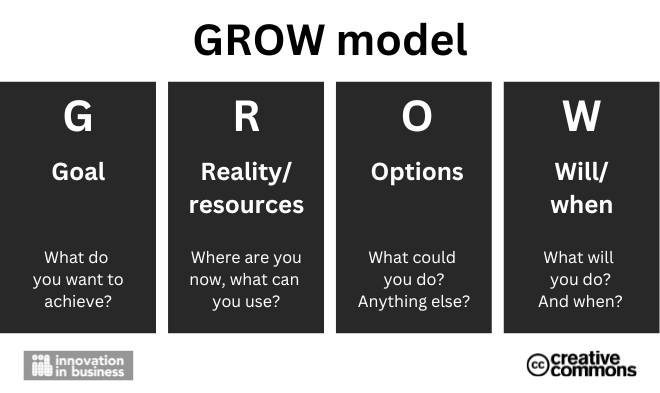Coaching – GROW model
Coaching has been shown to be one of the most effective ways of supporting local entrepreneurs. Whilst giving advice can be helpful in some circumstances, it doesn’t necessarily equip people with the tools they need to become successful social business leaders and drivers of change in their communities over the longer term. Mentoring also has its place, but still relies on the expertise of the mentor in specific areas.

Relational approaches
Coaching is considered a relational approach as it relies on the rapport that is built between client and coach, with the client enabled to trust their coach to guide them towards making better decisions for themselves over time. Click here to read more about ‘Relational approaches’
“What would the support system look like if it was 100% client-focused, and supported people to remove barriers that stood in the way of their success?” (The late, and wonderful Liz Cox, nef, 2010)
Coaching conversations follow a simple format, with a ‘contracting’ element at the beginning, where the coach helps the client to define their Goals (see GROW model image above) and ensure they are both clear on the intended outcomes of working together. The focus then turns to discussing the clients current Reality, and the availability (or not) of Resources that can help them to achieve their goals. This helps clarify what else the client may need to make progress.
Having defined their goals and resource needs, clients are then encouraged to think about what Options are available to them, in order to progess their ideas. The coach will help them assess these options on their own terms, and in the context of their thinking process throughout the goals and resources conversations. Finally, clients are encouraged to select the options that make most sense to them, and self-determine a timeframe for exploring and achieving these.
“Bizfizz coaches were given the space to develop their own local networks and support to form a panel of local business supporters – this panel allowed the coaches to remain pure in their coaching, bringing specific questions to the ‘hive mind’ of the panel to offer specific advice, contacts or technical ideas. The panel also served as a referral network for clients, coaches and local businesses.”
